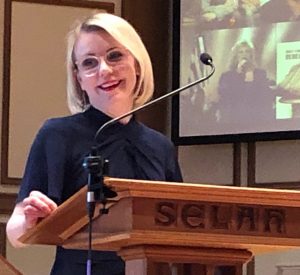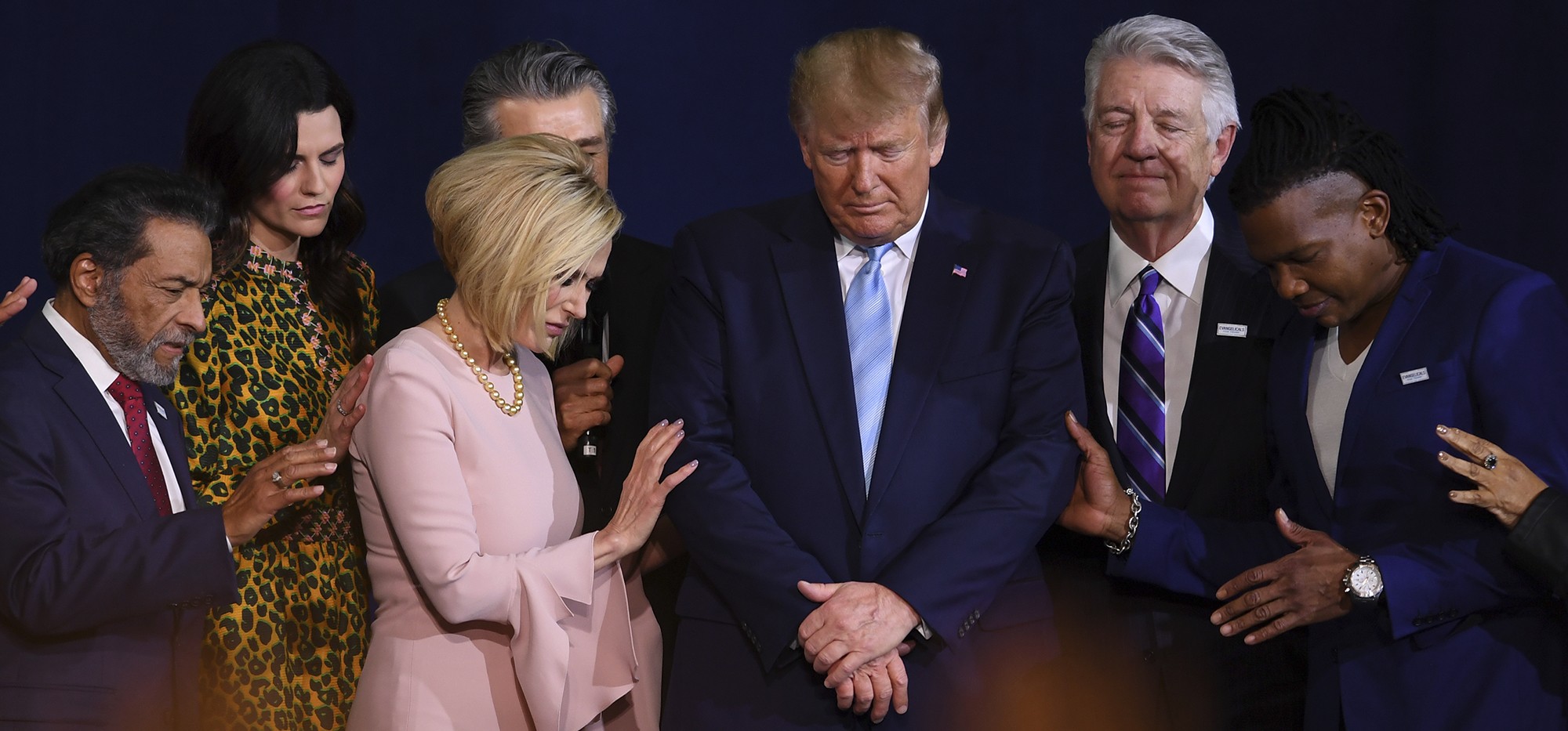A movement of charismatic Christians that ignores American exceptionalism and embraces “eschatological Israel” is gaining influence in the United States and abroad, observed American religious historian Leah Payne.
In a recent address at Baptist Seminary of Kentucky, Payne said this megachurch-based phenomenon is not concerned with the “city on a hill” vision of America promoted by evangelicals in the late 20th century. “There’s one king in this kingdom, Jesus, and he’s ruling over the world and has a mission in mind, but it’s not necessarily the United States,” Payne explained. “It’s the eschatological Israel.”

Leah Payne
Payne, associate professor of American religious history at Portland Seminary in Oregon, delivered the E. Glenn Hinson Lectures at BSK March 13. Her second book, God Gave Rock & Roll to You: A History of Contemporary Christian Music, was released this year by Oxford University Press.
In recent years, the worship songs created in megachurches and shared digitally have cultivated the informal networks that link charismatics and Pentecostals in the U.S. and other countries, Payne said. Within the movement, there are signs of “a kind of patriotism, even nationalism.” Yet its focus, she maintained, is more on Israel and its perceived role in the end times than on the U.S.
“They have produced enthusiastic support for one, Donald J. Trump, who shared with them an appreciation for a lot of things like celebrity and an affinity for a certain politic of disrespectability,” she said. “You might call it lowbrow know how in a very flamboyant aesthetic.”
However, more important to the Trump-supporting charismatics is that the former president “entertains this eschatological vision with concrete actions such as moving the U.S. embassy (in Israel) to Jerusalem.” She said the shift from Tel Aviv to Jerusalem was a “huge deal” in charismatic circles.
While Trump is immensely popular among charismatics, Payne qualified her remarks by noting not all charismatics support him.
During his time in the White House, Trump “welcomed charismatic and Pentecostal people and rebranded them,” said Payne, the daughter of a Pentecostal pastor. Trump made Pentecostal televangelist Paula White-Cain chair of his evangelical advisory board. Trump considers her his personal pastor.
“In no version of writings about evangelicalism that I have seen would you brand this woman an evangelical, and yet she was put in charge of this group,” Payne said.

A group of religious leaders gather around Donald Trump on Jan. 3, 2020, at an “Evangelicals for Trump” coalition launch. At left, Paula Cain-White, and at right, Jack Graham. (PI04 / MediaPunch /IPX)
While the end-times-focused movement of charismatics has been propelled by digital technology of the 21st century, Payne said some of its themes were evident at the Brownsville Revival in Pensacola, Fla., in 1995. She showed a video clip of a man at the revival playing a shophar, an instrument made from a ram’s horn. Shophars have been used in Jewish worship since ancient times and are sometimes played in conservative Christian services.
“In the charismatic imagination, it is not to be used for a solemn occasion,” Payne explained. “But, as in the story of Gideon, it is used for war.”
In her description of that service, Payne said one man prayed, “Lord, we are believing you for the nation. We are believing you for the White House.”
Payne said this movement of charismatics exhibit a version of nationalism that is portable but “subservient to eschatological Israel.” One example is a social media post by former Brazilian First Lady Michelle Bolsonaro, a charismatic Christian, after she cast a ballot for her Catholic husband, Payne said. In her post, Bolsonaro asked God’s blessing upon Brazil and Israel.
To illustrate the vast reach of the music produced in charismatic churches, Payne cited the success of a music video of a dance anthem written by Gui Brazil, a Christian D.J. living in Portugal. This 19-minute video, which was produced by Jesus Image, a congregation in Orlando, Fla., garnered 63 million online views. She noted Elevation Church, a congregation in Charlotte, N.C., that recently disaffiliated with the Southern Baptist Convention, also is a prolific producer and distributor of worship music.
Worship music produced in congregations began its ascent as contemporary Christian music’s audience decreased, Payne said. CCM rose in popularity in the latter part of the 20th century and featured artists such as Amy Grant, Michael W. Smith, Sandi Patty and Carman.
Like the broader music industry, CCM suffered financially in the early 2000s when consumers began sharing files downloaded from the internet. Payne said CCM also was hurt by changing demographics and church attendance patterns and the decline of evangelical denominations, whose large youth gatherings provided a platform for CCM. In addition, Payne stressed that evangelical moms, who bought CCM to promote conservative Christian values to their children, had diminishing influence over their children’s musical selections once file sharing started.
“When we are talking about evangelicalism, we cannot have Billy Graham in our minds. That era has passed.”
CCM artists were promoters of American exceptionalism and the conservative social values championed by traditional evangelicals, but Payne said that form of evangelicalism, like CCM, has shrinking sway in American life.
In an era when Christian nationalism is a prominent issue, Payne said it is important to understand what type of nationalism is being considered. “Is it based on a form of American exceptionalism or is it a more portable transnational form?” she asked.
Payne sees the latter form gaining the upper hand.
“What I am going to suggest to you is the group that was once on the outside, the fringe, has now become the dominant strain,” she contended. “So, when we are talking about evangelicalism, we cannot have Billy Graham in our minds. That era has passed.”
The evangelicalism Graham typified is not being replaced by a “conservative Southern Baptist form of evangelicalism that most people have in their mind when they are saying ‘evangelical,’” Payne said. She described the successors as much more diverse.
“It’s a transnational group of people who are connected through media and through the market,” she said. “And they don’t need traditional institutions in order to thrive and survive.”


